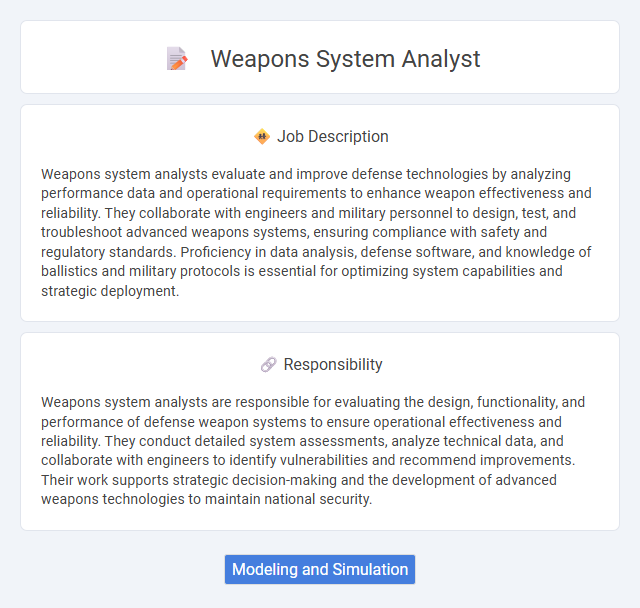
Weapons system analysts evaluate and improve defense technologies by analyzing performance data and operational requirements to enhance weapon effectiveness and reliability. They collaborate with engineers and military personnel to design, test, and troubleshoot advanced weapons systems, ensuring compliance with safety and regulatory standards. Proficiency in data analysis, defense software, and knowledge of ballistics and military protocols is essential for optimizing system capabilities and strategic deployment.
Individuals with strong analytical skills and a keen interest in defense technology are likely suitable for a Weapons System Analyst role. Those who thrive in detail-oriented environments and can interpret complex technical data may find this job aligns with their abilities. However, people uncomfortable with high-pressure situations or working in highly regulated sectors might find this role challenging.
Qualification
Weapons system analysts require a strong background in engineering, computer science, or related technical fields, typically holding a bachelor's degree or higher. Expertise in systems engineering, defense technologies, and data analysis tools is crucial for evaluating and optimizing weapon systems' performance. Proficiency in software modeling, risk assessment, and understanding military standards and protocols further enhances an analyst's capability to deliver precise and actionable insights.
Responsibility
Weapons system analysts are responsible for evaluating the design, functionality, and performance of defense weapon systems to ensure operational effectiveness and reliability. They conduct detailed system assessments, analyze technical data, and collaborate with engineers to identify vulnerabilities and recommend improvements. Their work supports strategic decision-making and the development of advanced weapons technologies to maintain national security.
Benefit
A Weapons System Analyst likely enhances defense capabilities by ensuring optimal performance and reliability of weapon systems, which may lead to increased national security and operational efficiency. This role potentially offers benefits such as competitive salaries, opportunities for advanced technical training, and the chance to contribute to critical defense projects. Career growth and job stability within defense sectors might also be probable advantages of this profession.
Challenge
Weapons system analyst roles likely involve complex problem-solving as they assess advanced military technologies and integrate multi-disciplinary data for system optimization. Challenges may arise from the need to balance technical accuracy with operational constraints under tight deadlines. The probability of encountering evolving threats and rapidly advancing technology requires continual learning and adaptive analytical methods.
Career Advancement
Weapons system analysts leverage technical expertise in defense technologies to design, test, and improve advanced weapon systems. Career advancement typically involves gaining specialized knowledge in systems engineering, cybersecurity, or project management, enabling progression to senior analyst, program manager, or defense contractor roles. Advanced certifications and security clearances significantly enhance opportunities for leadership positions within military and government agencies.
Key Terms
Modeling and Simulation
Weapons system analysts specializing in modeling and simulation develop intricate digital models to evaluate weapon performance and operational effectiveness under various scenarios. They utilize advanced simulation software and data analysis techniques to predict system behavior, identify potential issues, and optimize design parameters. Their work supports decision-making in defense projects by providing accurate risk assessments and virtual testing environments.
 kuljobs.com
kuljobs.com